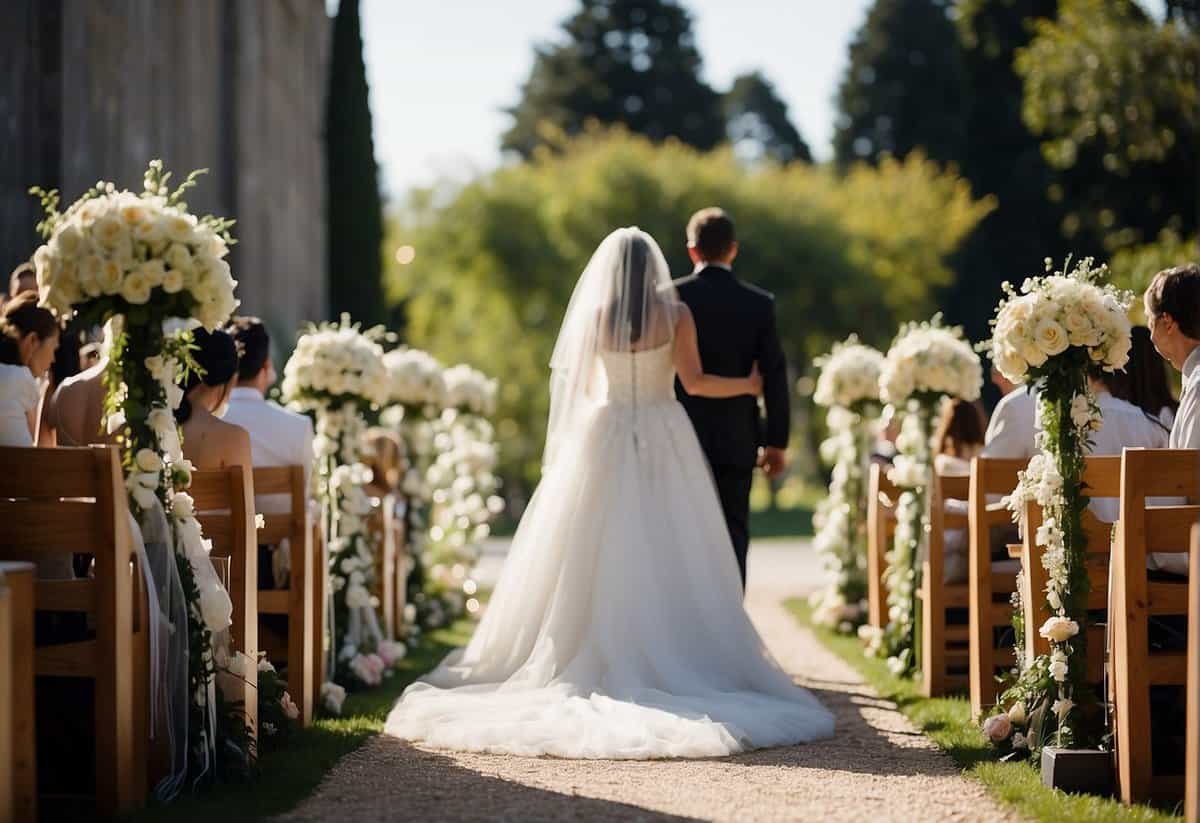Can a Mother of the Bride Walk Down the Aisle Alone? Embracing Solo Entrances
Weddings are steeped in tradition, yet they’re also a reflection of the times and personal preferences. The question of whether a mother of the bride can walk down the aisle alone speaks to a broader conversation about the evolving roles and customs in modern weddings. At the heart of this issue is the recognition that every family structure is unique and that the ceremony should honor those nuances.

Traditionally, the walk down the aisle is a symbolic moment, one that represents a changing of the guard from one family to another. But what if tradition isn’t one-size-fits-all? Whether it’s due to a smaller family, personal choice, or the desire to make a statement about her independence and prominence, a mother of the bride certainly can walk down the aisle alone. This solo walk can signify strength, pride, and the celebratory acknowledgment of the role she played in her child’s life leading up to this special day.
Key Takeaways
- A mother of the bride can walk down the aisle alone as an expression of individuality or personal circumstances.
- The processional order can be tailored to fit the unique dynamics of each family and their values.
- When planning the walk, consider the significance of the role and the message it conveys to the attendees.
Significance of the Processional

When you watch a wedding processional, you’re witnessing more than just a cue to start the ceremony; it’s a display of relationships, traditions, and personal values. Whether it’s the bride making that much-anticipated walk down the aisle or relatives taking their place, each step is loaded with meaning.
Symbolizing Independence
If you are considering having the mother of the bride walk down the aisle alone, it’s a powerful symbol of independence. This act can highlight the personal journey she has gone through and the strength she embodies. It’s a poignant moment that celebrates not only where she’s come from but also her individual role in the wedding ceremony.
Breaking Tradition
Choosing to break from the tradition of being escorted can be liberating. If you’re a bride who values autonomy, this choice reflects your desire to enter into marriage as an equal partner. It can also reflect a modern approach to weddings, challenging the conventional expectations of a wedding processional.
Family Dynamics
The way family members are involved in the processional often mirrors the family dynamics. If a mother walks down the aisle on her own, it can indicate respect for her position within the family. It also allows for flexibility if traditional roles don’t fit your family setup, acknowledging that each wedding ceremony is as unique as the people involved.
Role of the Mother of the Bride

The mother of the bride holds a special place in the wedding as a symbol of support and love. Familiarize yourself with her traditional roles and the modern alternatives available for her walk down the aisle.
Honoring the Maternal Figure
Traditionally, the mother of the bride is the one who embodies honor and reverence in the wedding ceremony. This role is not just about walking down the aisle; it symbolizes the support and affection she has provided her daughter throughout her life. At the ceremony, the mother’s entrance sets the tone for the family’s involvement in the wedding. While tradition often pairs her with the father of the bride or a male relative as an escort, contemporary weddings celebrate her place in the wedding, occasionally having her walk down the aisle alone to spotlight her contribution and status in the family.
Alternative Escorts for the Bride
If the mother of the bride prefers not to walk alone, there are various alternative escorts she can choose from. These can include a stepfather, a biological father, if they have a positive relationship, or any other family members that have played a significant role in her life. The choice of escort is a personal decision that should reflect her importance in the wedding and her bond with the bride. It’s your special moment in the ceremony, so selecting someone who represents love and support is essential.
Planning the Ceremony Walk

When you are planning your wedding day, the organization of the ceremony, especially how you orchestrate walking down the aisle, is one of the most memorable aspects. Ensuring that everyone understands their role and timing can alleviate nerves and contribute to a seamless experience.
Order of the Processional
The processional order is crucial to the flow of your ceremony. Traditionally, the processional starts with the officiant, followed by the groom and the best man, who often take their places from the side rather than walking the aisle. Next, the wedding party follows in a specific sequence: bridesmaids, groomsmen, the maid of honor, and the best man if not already in place, often in pairs. The precious flower girl and ring bearer come next. Lastly, your mother can indeed walk down the aisle alone, if she wishes, before you, the bride, make your grand entrance. A professional wedding planner can provide guidance on customizing this order to your preference, including non-traditional roles and sequences.
Preparing for the Aisle Walk
Preparing for the aisle walk involves more than practice and timing; it’s about comfort and confidence. If your mother chooses to walk down the aisle alone, support her decision and ensure she feels honoured in her moment. It’s important to consider the venue layout, as it will determine the length of the aisle walk and the pacing required. Inform your family and guests who might expect traditional pairings that your mother will have a solo walk, highlighting its significance to the day. For a personal touch, select a piece of music that is meaningful to both you and your mother, creating a memorable moment for all in attendance. Remember, deviation from tradition to fit your family dynamics is a modern approach embraced in many ceremonies, reflecting your uniqueness on this special day.
Frequently Asked Questions

Navigating through wedding traditions and customs can be a delightful journey. Here, we address your curiosities about the roles mothers play during wedding ceremonies, particularly when it comes to their entrance and involvement in the procession.
What is an appropriate song for the mother of the bride to enter to when walking down the aisle?
The song choice for when the mother of the bride walks down the aisle should reflect her personality and the tone of the ceremony. Classical tunes or soft instrumentals are commonly chosen for their timelessness and elegance.
In wedding ceremonies, who is traditionally responsible for escorting the mother of the groom?
Traditionally, the mother of the groom is escorted down the aisle by an usher or a close male relative such as her son, before the bridal party makes their entrance.
In a Catholic wedding, what are the norms for procession involving the mother of the bride?
In Catholic weddings, the mother of the bride is often the last to be seated before the wedding processional begins, signaling the imminent start of the ceremony. She may walk alone or be escorted by a family member.
Between the two, which mother is conventionally escorted down the aisle first during a wedding ceremony?
Conventionally, the mother of the groom is escorted down the aisle before the mother of the bride, establishing the order of prominence and honoring both mothers.
Is it common for the bride to be accompanied by her mother when walking down the aisle?
It’s increasingly acceptable for a bride to choose her mother as her escort down the aisle if that aligns with her personal preference or familial circumstances.
What are some alternative options for who might walk a bride down the aisle if her father is not present?
A bride has numerous options, such as having a grandparent, sibling, close friend, or even walking solo down the aisle to meet her partner.

